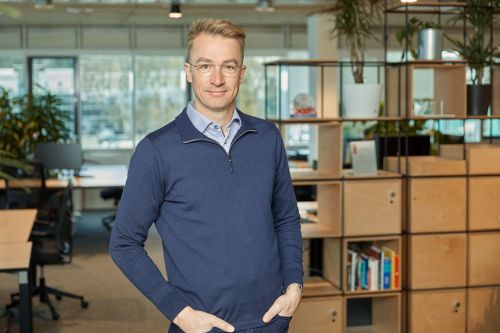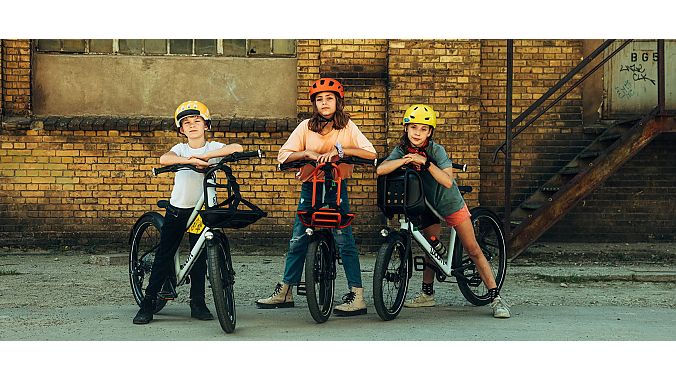MONTEREY, Calif. (BRAIN) — Woom bikes celebrates a return to in-person events this year after the COVID-19 outbreak with the March announcement it signed a three-year sponsorship agreement to be the official kids bike manufacturer of the Sea Otter Classic. The company also is venturing into a new product category: an "urban commuter and cargo-bike hybrid" for kids.
The brand is sponsoring the Sea Otter Kids' Zone by offering free bike demos for ages 12 and under on age-appropriate obstacles and a separate balance bike area. It also has a 20x40-foot booth (S100) inside the Kids' Zone.
The sponsorship agreement continues a newsworthy past year for the brand, which announced in July it merged with woom Europe, based in Klosterneuburg, Austria. The merger doubled the direct-to-consumer brand's global workforce, optimized and enhanced product innovation — woom is debuting three new models at Sea Otter — and further developed its supply chain and manufacturing capabilities.
Then in August, woom — which has its U.S. operations based in Austin, Texas — was named to the Inc. 5000 list of fastest-growing private companies for 2021. At No. 1,198, woom earned the recognition for the third consecutive year, amassing a three-year growth rate of 404%.
Getting the brand in front of its growing customer base at an event that promotes cycling to kids has CEO Mathias Ihlenfeld excited for what's to come in 2022.
"Most importantly, we are looking forward to connecting in person with all of the amazing families that have supported woom and fostering relationships with those new to the brand," Ihlenfeld said. ... "This partnership aligns with our goals, how we had activated at events in the past, and how we want to show up moving forward, with demo and learn-to-ride opportunities integrated into the on-the-ground experience. When kids jump on a woom, there is a lot of joy, so it is a natural fit to build off of the magical environment Sea Otter has dedicated to their youngest participants."
Ihlenfeld brought woom to the U.S. in 2014, a year after his brother Marcus and business partner Christian Bezdeka founded the brand in Vienna. But it's been in the past two years, when it was grounded from in-person events, when woom underwent the most significant changes.
"Our supply chain was disrupted pretty significantly over the past two years," Ihlenfeld said. "The bike industry benefited from being one of the few things that families could continue even through lock-down periods. However, that generated a huge demand globally which led to a very constrained supply across the industry."
Woom invested during that period, adding more partners globally to support the supply chain. It added new component suppliers, brought in new assemblers to increase the overall output, and added fulfillment sites closer to its end customers.
"We also aligned with more transportation partners to ensure vessel space and trucking capacities were available when we needed them," he said. "Gone are the days when we would have typically aligned with only one or two key partners to leverage volume, price, and relationships. Success today is based on a much larger and broader network of partners and a willingness to be creative throughout the entire supply chain."
While woom is direct-to-consumer in North America, it operates an omnichannel distribution model in Europe, with a mix of retail, distributors and direct-to-consumer. "We are seeing significant growth in our existing core markets, and we are always looking to fulfill the demand for woom bikes in new countries," Ihlenfeld said. "Woom bikes are popular in many markets, and our goal is to scale quickly enough to meet this demand."
Sustainability has been a core belief at woom, and its upCycling membership program allows for upsizing and receiving 40% back on the purchase price. UpCycling bikes are inspected and refurbished and sold as "certified pre-owned." The one-time membership cost is $59.
In mid-2021, Ihlenfeld said woom began working with climate start-up Glacier to take action to reduce its climate footprint. In March, it joined with other cycling companies by signing the Bike Charta, a corporate social responsibility action plan for resource conservation, sustainability, and climate protection around products and services in the industry.
"We engage in numerous activities to promote cycling in and outside of our company," he said. "Woom employees are invited to cycle to work. The company has been active in numerous activities such as the car-free day and the European Mobility Week. We know we are not perfect yet. But we are working on getting a little better every day."
At Sea Otter woom is showing the new woom NOW model, billed as a lightweight urban commuter and cargo-bike hybrid with an integrated front rack and smaller front wheel for added stability carrying cargo. It comes in three sizes and retails at $750 to $850 depending on size.
"We designed a cool bike for the city that lets kids easily get where they need to go by bike, even when they've got a backpack, groceries or a gym bag," said Matthias Leite-Gürtner, the head of the woom product design team.
Woom is at booth S100 at the Sea Otter expo.








